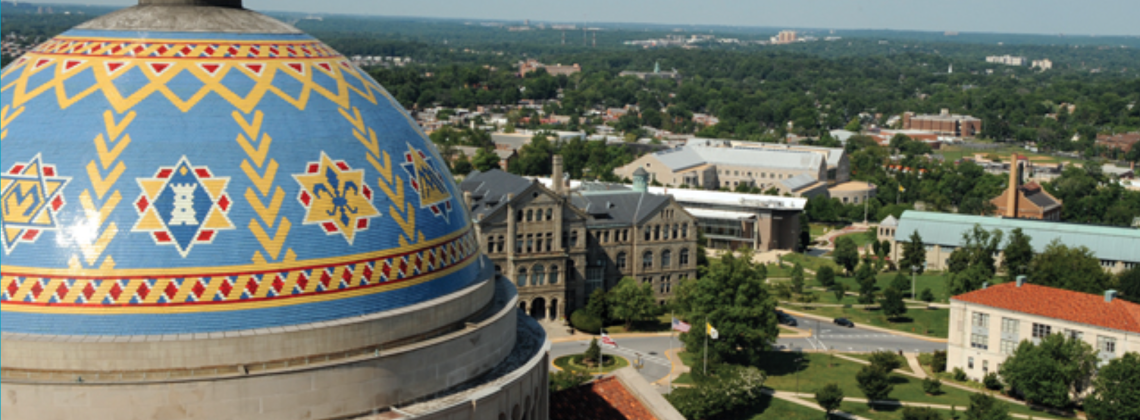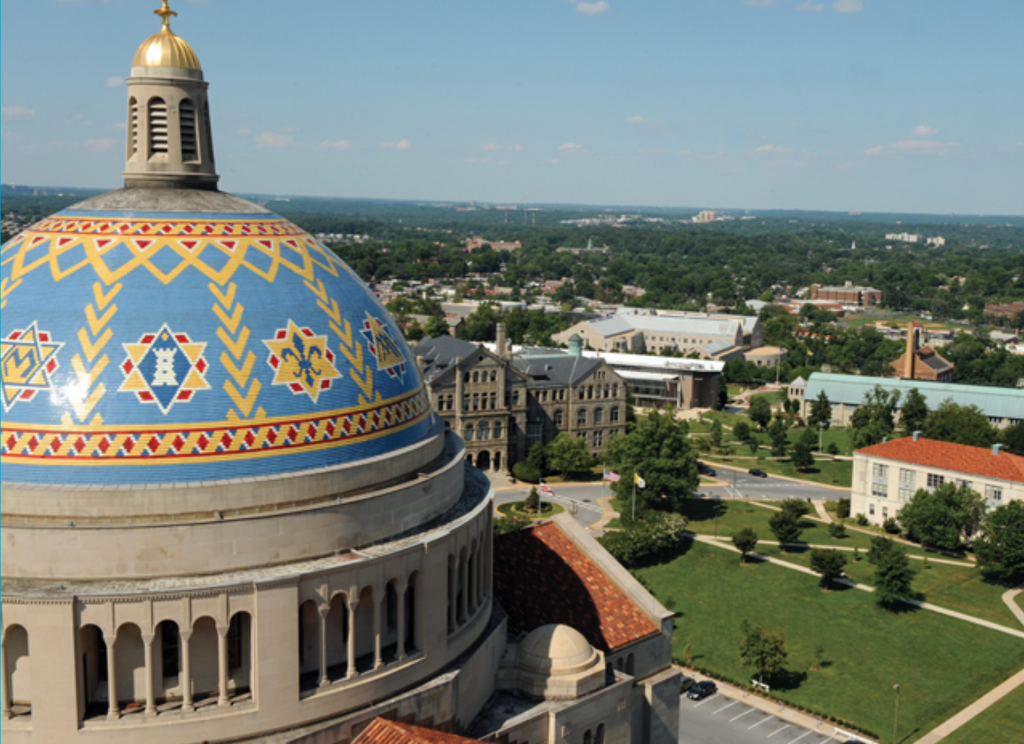

Is there—or is there not—a higher good?
Catholic institutions of higher learning ought to pay attention to the Claudine Gay plagiarism scandal, not because of its highly charged politics but because of their unique missional callings. When Harvard was founded in 1636 with a Puritan/ Congregationalist mission, its original motto was “In Christi Gloriam,” or “For the glory of Christ.” After nearly three centuries of mission drift, its motto today is “Veritas,” shortened to mean simply “Truth,” which seems more like a punchline to a joke, given the university’s recent scandal. Harvard’s mission webpage does not mention spirituality at all, assuring students only an emphasis on “a more just, fair, and promising world” absent religion’s telos, or end goal.
A visit to nearly any Catholic college or university’s web page reveals a different story. Take, for example, Notre Dame’s mission page, which states that it “draws its basic inspiration from Jesus Christ as the source of wisdom.” Unfortunately, while Catholic universities may claim they are offering different models from that of Harvard, what the public perceives (and perhaps finds within the universities themselves) is not convincing them that higher education of any sort is keeping to its claims. Right now, almost half of American parents claim they would rather not send their children to any institution of higher learning, regardless of cost or other factors. While Generation Z may be rebelling in other ways from their parents, they aren’t in this area: 46% believe college is not worth it, and 39% do not plan to pursue a degree.
There is also clearly a concerted link between the public’s growing distrust of higher education and its distrust of church and organized religion. At the same time that Americans have questioned the gains they are receiving from higher education, participation in a faith journey or in organized religion has also waned. According to one Associated Press poll, 30% of Americans identify as “Nones,” those who don’t identify with any religious group.
As a professor at a private Catholic university, I am discouraged by this distrust of both higher education and organized religion, and despite our university’s differences in mission, I respect the work that Harvard does. In my classes I have always aspired to give my students the education I imagine they might receive from Harvard. When I am in rooms with colleagues from Harvard at literary conferences, I admit with some embarrassment that I have always been a little bit in awe of their pedigree. To me and others, those faculty have always represented an ideal in higher education: Veritas. Truth.
In light of this reverence for the institution I have to admit that it personally hurt my heart to witness President Gay falter as she has. This incident not only incited a pang of disappointment but also cemented a sneaking distrust that’s been growing inside of me about the ideals I once believed undergirding higher learning as a whole, ideals to which I’ve dedicated my life’s work.
The words that will reverberate most from Gay’s plagiarism ordeal aren’t the ones she’s stolen—perhaps—but rather her justification for it. “I failed to convey what is my truth,” she said in an apology. My truth.
When I teach, I aspire to act as a model for my students, not to convey my truth in the classes I teach but rather, as a Catholic professor, to convey at least a portion of the truth that I hope students are piecing together from the entirety of their collegiate experience. Jesus says to his apostles in John 14:6, “I am the way, the truth, and the life.” At Catholic institutions, unlike secular ones, we still have a specific truth to aspire to; it is the truth for us. As Notre Dame’s webpage elucidates, “Jesus Christ” is our “inspiration.” He is the truth Catholic institutions hope to show their students, no matter how large or small the institutions are or how recognizable their names may be.
Considering this model of higher education, I try to go into my classes with well-prepared lectures and creative activities. I spend office hours grading with intention and enthusiastically discussing ideas with students. I spend Saturday afternoons writing articles like this one because I want Catholic higher education to continue to represent the truth Jesus promises he is to believers. I’m not a perfect teacher or person, but I’m made better because I have a model of perfection to follow.
As Catholics, we believe priests act In persona Christi, in the person of Jesus. Faithful lay Catholics who receive the sacrament of baptism become common priests who similarly give our lives to God and model his path for others. Whatever our vocation is, as Catholics, we are representatives of the faith in our positions. This vocational representation includes all those within academe.
Claudine Gay, in her position as Harvard’s President, was a kind of common priest, representing a secular and relativistic ideal of modeling “her truth” in higher education, one disengaged from religion. In her response to this controversy, she failed America’s higher educational system broadly. Not only did she plagiarize, but she also lied and then minimized her actions. Such equivocation and moral floundering from someone in her public-facing role at the U.S.’s best-known university indicates that the academy has not been focused on making its professors, administrators, and, most importantly, students better scholars and people. Rather, those in charge have been focused inward, on themselves, on their truth—not the truth geared toward a higher good.
With its unique missional call, Catholic higher education now has an opportunity to lead and serve students and society at large in a way like never before. Professors and administrators at religiously affiliated institutions can proclaim just how we are set apart from other places, including Harvard. We must not squander this chance to stand for actual truth and regain the confidence of the U.S. populace.
I predict that because of the emergence of AI plagiarism detectors there will soon be an onslaught of stories about cheating and dishonesty that will rock the world of higher education at every level, well beyond this singular controversy. The Catholic Church, armed with lessons from its own recent scandals and cover-ups, ought to be able to lead a movement of educational and institutional renewal.
Yes: Catholic institutions of higher learning can shed beautiful, redemptive light on the truth we claim to espouse in our classrooms and administrative offices. To put it bluntly, we can atone for the past sins of higher education.
A few days ago at the International Federation of Catholic Universities, Pope Francis remarked, “A Catholic university must make choices, choices that reflect the Gospel.” This crisis in higher education ought—borrowing Notre Dame’s language again—to “inspire” such a choice. Let us choose to commit to inspiring faith in our Catholic institutions, faith in every sense of the Word.
LuElla D’Amico is an Associate Professor of English and the Women’s and Gender Studies Coordinator at the University of the Incarnate Word. She is co-editor of Girls’ Series Fiction and American Popular Culture and co-editor of Reading Transatlantic Girlhood in the Long Nineteenth Century. Her current book project examines exploring the Catholic faith through the wonder of children’s literature.
Photo: The Catholic University of America
“Veritas” already has become the punchline of a joke in Ariel Sabar’s brilliant 2020 book, _Veritas_. It not only exposes how Harvard professor Karen L. King rigged her analysis of her so-called Gospel of Jesus’ wife fragment but how then the _Harvard Theological Review_ shockingly rigged the peer review to make sure it got published – all because they were determined to believe in what turned out to be a fake by a pornographer con man. King even knew who had supplied her with the fragment but, unlike Sabar, did not want to try to find out anything about him or try to verify his unlikely story. Of course, there have been no consequences for any of this. Sabar’s point is that King was taking a “my truth” approach rather than caring about the truth. Sabar’s book should be required reading at Harvard.